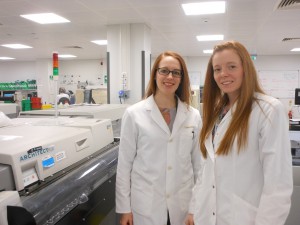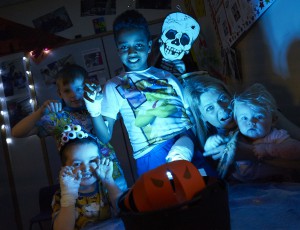 Young patients at Heartlands Hospital were given a ‘spooktacular’ treat today when nursery nurses on the children’s ward threw a Halloween party.
Young patients at Heartlands Hospital were given a ‘spooktacular’ treat today when nursery nurses on the children’s ward threw a Halloween party.
Organised by Samantha Phillips and Julie Luckman – nursery nurses on Ward 16 – 10 patients from just a few months to 11-years-old, enjoyed games and a special appearance by a magician, David Oakley. He entertained the children with a scary box of tricks, including ‘Dracula’s creepy coffin’. They enjoyed themed games including ‘pin the spider on the web’ and each received a goody bag of spooky treats.
Julie Luckman, Nursery Nurse on Ward 16, commented: “We try to make our patients’ stay in hospital fun and Halloween is a great opportunity to play games and dress up. The children all really enjoyed the magic and games and especially enjoyed the Halloweeny green popcorn.”
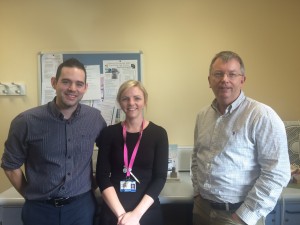 Patients with learning disabilities suffering with hearing loss are benefiting from a new service at a Birmingham hospital.
Patients with learning disabilities suffering with hearing loss are benefiting from a new service at a Birmingham hospital.
With up to 40% of adults with learning disabilities suffering from hearing loss, the Adults with Complex Needs Clinic at Heartlands Hospital will provide a specialised service to help patients get treatment and support for hearing loss.
Those attending the clinic will be seen by an audiologist for hearing assessments and to be given a better understanding of their condition. They will be offered individual treatment plans to help manage their condition. This may include communication advice, fitting hearing aids, or performing micro-suction to remove wax build-up etc.
Senior audiologist Esther Sewell, who leads the team, said: “Hearing loss can be a ‘forgotten’ condition and can be difficult to identify in people with learning disabilities because of the nature of their disability. Through our clinic, we will offer a service for adults with complex and specific needs, such as learning disabilities, but also conditions such as severe dementia.
“The patients receive personalised care for their individual needs, fitting around the patient rather than the patient fitting around the doctors, in a familiar and safe environment. They have the chance to get to know the staff who are treating them and we also support the carers, who can often feel neglected.
“We are now looking to raise awareness of the service as research has shown that far less people go to the clinic than should be the case for the demographics we have. In time we aim to go out into the community, working with local day centres and care homes, for example.”
The clinic is based at the Heartlands Hearing Centre. For more information contact Esther Sewell by emailing esther.sewell@heartofengland.nhs.uk
The NHS Central England Abdominal Aortic Aneurysm Screening Programme, hosted by the vascular department at University Hospitals Birmingham NHS Foundation Trust, provides screening to men aged 65+ within Birmingham, Solihull, Sandwell, South East Staffordshire and East Staffordshire.
Abdominal Aortic Aneurysm (AAA) screening is a way of detecting swelling of the aorta – the main blood vessel that runs from the heart through to the abdomen and to the rest of the body.
This type of swelling is more common in men aged over 65 than it is in women and younger men, so men are invited for screening in the year they turn 65. Men who have not received screening over the age of 65 can contact the programme to request a scan.
Men are approximately six times more likely to have an abdominal aortic aneurysm than women. The risk of having an abdominal aortic aneurysm can also increase if:
- you smoke
- you have high blood pressure
- a brother, sister or parent has, or has had, an abdominal aortic aneurysm
Kimberley Kavanagh, AAA screening co-ordinator at Heartlands Hospital, said: “If you have an aneurysm you will not usually notice any symptoms. This means you cannot tell if you have one, you will not feel any pain and will probably not notice anything different.
“We offer screening so we can find aneurysms or swelling early and monitor or treat them. This greatly reduces the chance of the aneurysm causing serious problems.”
So what happens at a screening? Kimberley explains: “We use a simple ultrasound scan, similar to that offered to pregnant women. This is very quick and usually lasts less than 10 minutes.
“At the clinic we will check your personal details, explain the scan and give you the chance to ask any questions.
“We will ask you to lie down and then run a small ultrasound scanner on your abdomen. We will put a cool gel on your abdomen and then slide the scanning sensor over your skin. The scan will show a picture of the aorta on a screen and we will measure it.
“We will reveal your results straight away and also send a copy to your GP practice.
“If your abdominal aorta is normal, you won’t ever be invited for another screening.
“If you have a small to medium-sized aneurysm, you’ll be invited back for regular scans to check its size.
“If you have a large AAA, you’ll be referred to hospital to be seen by a vascular surgeon within two weeks. You will then be advised about treatment.”
For further information or to arrange an appointment please call 0121 424 3612/ 0121 424 1200 or email aaa.screening@heartofengland.nhs.uk.
Clinic locations
The AAA screening programme is available in the following locations.
| Clinic | Area | Postcode |
|---|---|---|
| Hockley Medical Practice | Hockley | B1 |
| Washwood Heath Health and Wellbeing | Clodeshall Road, Saltley | B8 |
| Sparkhill Primary Care Centre | Sparkhill | B11 |
| Greenridge Surgery | Billesley | B13 |
| All Saints Medical Centre | Kings Heath | B14 |
| Summerfield Primary Care Centre | Winson Green | B18 |
| Finch Road Primary Care Centre | Lozells | B19 |
| Handsworth Wood Medical Centre | Handsworth Wood | B20 |
| Stockland Green Health Centre | Erdington | B23 |
| The Dove Primary Care Centre | Perry Common | B23 |
| The Swan Medical Centre | Yardley | B25 |
| Selly Oak Health Centre | Selly Oak | B29 |
| Broad Meadow Health Centre | Kings Norton | B30 |
| Woodgate Valley Health Centre | Woodgate Valley | B32 |
| Richmond Primary Care Centre | Bordesley Green/Stechford | B33 |
| Castle Vale Primary Care Centre | Castle Vale | B35 |
| Hodge Hill Primary Care Centre | Hodge Hill | B36 |
| Chelmsley Wood Primary Care Centre | Chelmsley Wood | B37 |
| West Heath Primary Care Centre | West Heath | B38 |
| Perry Park Surgery | Perry Barr | B42 |
| Tower Hill Partnership for health | Perry Barr | B42 |
| The Oaks Medical Centre | Great Barr | B44 |
| Smethwick Medical Centre | Smethwick | B66 |
| Oldbury Health Centre | Oldbury | B69 |
| Dartmouth Medical Centre | West Bromwich | B70 |
| The Lyng Centre for Health | West Bromwich | B70 |
| Sutton Cottage Hospital | Sutton Coldfield | B72 |
| Sir Robert Peel Hospital | Tamworth | B78 |
| Tanworth Lane Surgery | Shirley, Solihull | B90 |
| Monkspath Surgery | Shirley, Solihull | B90 |
| Hobs Moat Surgery | Solihull | B92 |
| Balsall Common Health Centre | Balsall Common | CV7 |
| Winshill Medical Centre | Burton on Trent | DE15 |
| Yoxall Health Centre | Yoxall | DE13 |
| Glebefields Health Centre | Tipton | DY4 |
| Black Country Family Practice, Neptune | Tipton | DY4 |
| Northgate Surgery | Uttoxeter | ST14 |
| Samuel Johnson Hospital | Lichfield | WS13 |
 Two thirds of a set of triplets, Jacques and Benedict Barker, took on a challenge to cycle 95km to show their appreciation to the award-winning Neonatal Unit at Heartlands Hospital.
Two thirds of a set of triplets, Jacques and Benedict Barker, took on a challenge to cycle 95km to show their appreciation to the award-winning Neonatal Unit at Heartlands Hospital.
Thirteen-year-old Jacques and Benedict, along with their sister Giselle, were born seven weeks premature and were cared for by the unit. They raised an impressive £2,014.93 with their bike ride, which started at Church Stoke on the Powys/Shropshire border and finished in Aberdovey, Wales.
Jacques and Benedict are students at Solihull School and came up with the idea for the challenge as part of a lower school diploma project. They had to research, plan, organise and complete an event and then give a presentation to their classmates during an assembly. After their presentation, they handed the money over to Sarah Moxon, lead nurse from the Neonatal Community Outreach Team at Heartlands Hospital. Sarah said: “I am pleased to see Benedict, Jacques and Giselle doing so well after their difficult start in life and especially happy that they have kindly raised this impressive amount of money for our Neonatal Unit where they were treated.”
Heartlands Hospital’s community fundraiser, Uzma Shaheen, who co-ordinates all charitable and fundraising events for the hospital, said: “We are very lucky to have so many committed supporters of our Charity who are kind enough to take on all sorts of activities and challenges to fundraise for us. I would like say a massive thank-you to Jacques and Benedict for their efforts in cycling across Wales to raise money for our Neonatal Unit at Heartlands. This unit carries out very important, life-saving work on a daily basis and the money the boys have raised will go towards helping to care for premature babies from across the Birmingham and Solihull areas.”
For more information on the Heart of England NHS Foundation Trust Charity or to make a donation to a hospital, ward or appeal, please visit www.heartofenglandcharity.org.uk.
Published: 27/10/15
Did you know lung cancer is the most common cause of cancer related death in the United Kingdom? Over 41,000 people are diagnosed with the condition every year (source: www.nhs.uk).
November is Lung Cancer Awareness Month which aims to raise awareness of the disease and how people can spot the early signs and symptoms. So what are some of the common symptoms to look out for?
- A bad cough which doesn’t go away for at least three weeks, or that changes and becomes more severe
- Unexplained, persistent breathlessness.
- A chest infection that won’t go away even when it has been treated with antibiotics.
- Hoarseness or swelling of the face and neck.
- Coughing up phlegm with signs of blood in it.
- Pain in the chest or shoulders when breathing or coughing.
- Tiredness and weight loss.
If you have any of the above symptoms you should see your GP. The most common cause of lung cancer is smoking. Smoking and using other types of tobacco products can increase the risk of developing lung cancer and other cancers including cervical and mouth. People who have never smoked can also develop the condition as a result of passive smoking.
Surgery, chemotherapy and radiotherapy are the main treatments. Here at the Trust we provide support services for patients who have been diagnosed with lung cancer as well as support for their families.
Matthew Kear, lung cancer support nurse at Heartlands Hospital, says: “Across the Trust within the lung cancer team, we have lung cancer specialist nurses. Their role is to provide care for patients with lung cancer, and their families and carers. Nurses will support lung cancer patients throughout their treatment and give them information about treatments, support organisations and other services people may benefit from.
“Our lung cancer multi-disciplinary team provide individualised care to all patients with lung cancer and other tumours within the chest.
“The Trust also has lung investigation days where newly referred patients with suspected lung cancer are seen and assessed. The assessment includes a clinical evaluation, CT scan and if needed a bronchoscopy (a procedure that examines the airways of the lungs). This process ensures that patients are diagnosed and begin appropriate treatment with the minimum of delay.”
If you would like further information on lung cancer, please visit the Macmillan Cancer Support website: www.macmillan.org.uk.
Lung Cancer Awareness Month takes place every year in November.
Budding young boffins are invited to the ThinkTank Science Museum in Birmingham on Friday 30 October between 10am and 4pm to find out what it’s like to be a scientist.
Clinical scientists from Heart of England NHS Foundation Trust have helped to organise the event, ‘Meet the Scientist’, aimed at six to twelve year olds. The children will be given a lab coat, clip board and will use real tests to investigate three fictional patients with kidney problems.
The event is part of National Pathology week and the young scientists will learn where kidneys are located and what they do, how the kidneys act as filters and what happens when they don’t work. They will also learn about how the lab tests are carried out to assess kidney function and kidney disease.
Laura Lewis, a trainee clinical scientist at Heart of England NHS Foundation Trust and one of the organisers, said: “As trainee clinical scientists, we are keen to get involved in events that teach children about the work we do and the importance of staying healthy.”
For more information, please visit the I Love Pathology website.
Published:23/10/15
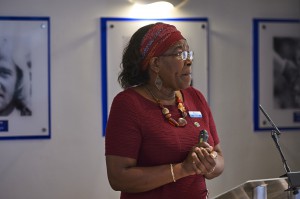 Birmingham recently welcomed hundreds of NHS staff from all over the country, for the seventh annual Chief Nursing Officer’s (CNO) Black and Minority Ethnic (BME) Advisory Group’s conference.
Birmingham recently welcomed hundreds of NHS staff from all over the country, for the seventh annual Chief Nursing Officer’s (CNO) Black and Minority Ethnic (BME) Advisory Group’s conference.
Hosted by Heart of England NHS Foundation Trust, the conference looked at the positive impact of change, the Workforce Race Equality Strategy and how to initiate conversations regarding inclusive and diverse leadership.
Over 200 delegates attended and Jane Cummings, Chief Nursing Officer for England, provided the keynote speech, including the importance of flexing care for individual patients. Chair of the CNO BME Advisory Group, Joan Myers OBE, gave an update on the work of the Group and Roger Kline from Middlesex University talked about the Workforce Race Equality Standard (WRES). The panel question and answer session asked how we can make valuing diversity and embracing change a lived experience for BME patients and staff.
Sue Crossfield, lead nurse for bereavement at the Trust, teamed up with Zafar Dad, from the Muslim community, to talk about the work they have been doing together to improve end of life care, including a short film, ‘I didn’t know that’, to help understand Muslim traditions related to dying and death. Other Trust staff involved on the day included trauma and orthopaedics matron Bev Baker, who spoke about how to be a successful ward leader and Theresa Harris, faculty educator, who received a standing ovation as she has just celebrated 51 years in the NHS.
Claire Whittle, acting head of education, was involved in organising the conference and commented: “Heart of England NHS Foundation Trust was delighted to host this conference looking at ‘Valuing Diversity – Embracing Change’ and we heard from some truly inspirational speakers who have motivated us all to champion matters affecting BME service users, communities and staff. I’d like to say thanks and congratulations to my colleagues and everyone who was involved to help make it a tremendous success.”
Published: 23/10/15
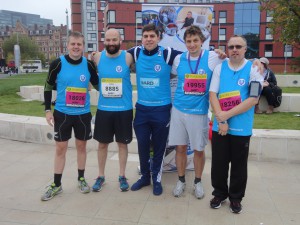 A team of twelve runners from The Heart of England NHS Foundation Trust Charity took part in this year’s Great Birmingham Run to raise money to support local cancer patients in Birmingham and Solihull.
A team of twelve runners from The Heart of England NHS Foundation Trust Charity took part in this year’s Great Birmingham Run to raise money to support local cancer patients in Birmingham and Solihull.
The majority of the runners who took part in the 13.1 mile half-marathon, did it for the 19for19 campaign, raising money for Ward 19 at Heartlands Hospital. This unit treats patients suffering from blood cancers. Another runner was raising money towards the respiratory unit which treats patients with breathing difficulties from across the region.
The 19for19 campaign has been organised by Solihull Barons Ice Hockey Captain, Rob Eley as part of his testimonial year before he retires at the end of the season. Rob has decided to raise money for Ward 19 as his wife Catherine recently finished treatment there.
Rob said: “Since my wife Catherine was admitted for treatment a second time, I was able to witness for myself the dedication and passion of the staff working on Ward 19 cancer ward at Heartlands Hospital. They work tirelessly every day to make the experience of their patients as comfortable as possible throughout an indescribably scary time.”
The head of fundraising for Heart of England NHS Foundation Trust Charity, Emma Hale, said: “We’re so grateful to all the runners who took part in aid of the charity this year. We’ve had a great response and been able to raise a lot of money for great causes across the hospitals we support. I’d like to thank each of the runners on behalf of the Charity and the Trust and congratulate them on completing the run. I hope they continue to help us make our hospitals even better.”
To find out more about the Heart of England NHS Foundation Trust Charity please visit www.heartofenglandcharity.org.uk or about the 19for19campaign, please visit www.heartofenglandcharity.org.uk/19for19.
Published: 21/10/15
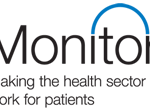 The Provider Regulation Executive, a committee of the health sector regulator Monitor, has confirmed that Heart of England NHS Foundation Trust is in breach of its licence to provide NHS services and has agreed to direct the trust board and governors to appoint a new interim leadership team.
The Provider Regulation Executive, a committee of the health sector regulator Monitor, has confirmed that Heart of England NHS Foundation Trust is in breach of its licence to provide NHS services and has agreed to direct the trust board and governors to appoint a new interim leadership team.
The trust board has agreed to the action required by the regulator.
Jacqui Smith – currently Chair at University Hospitals Birmingham (UHB) – will become interim Chair of the trust replacing Les Lawrence who has decided he will step down from the trust at the end of November.
Dame Julie Moore – currently Chief Executive at UHB – has been appointed interim Chief Executive of Heart of England, replacing Andrew Foster whose secondment finishes at the end of October.
Jacqui Smith will continue in her role as Chair at UHB alongside her work at Heart of England. Dame Julie Moore will spend the vast majority of her time at Heart of England while fulfilling the Interim CEO role.
In addition, the trust board has committed to Monitor that they will develop and implement short and long term financial plans to improve their finances.
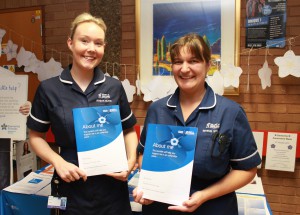 Good Hope Hospital has launched a new booklet designed to improve care for patients with dementia during their hospital stay.
Good Hope Hospital has launched a new booklet designed to improve care for patients with dementia during their hospital stay.
With one in four of our hospital patients having dementia, the user-friendly booklet, ‘About me’, can be filled in by the person that cares for them.
The booklet is designed to provide a snapshot of the patient, including their likes and dislikes; daily care needs; food and drink preferences and how they like to be communicated with so staff know more about them and can respond better to their needs. A ‘forget-me-not’ flower magnet, (the national symbol for dementia) is also placed on the patients name board to show staff that they have memory problems and can adjust their care needs accordingly.
‘About me’ was developed by a range of trust staff, including specialist nurses and elderly care consultants. Following the successful launch at Good Hope Hospital it will be rolled out across the other Heart of England Foundation Trust hospital sites.
Rachel Martin, Heart of England NHS Foundation Trust dementia practitioner, said: “People with dementia can become agitated when they are in an unfamiliar environment. ‘About me’ is helping our staff to communicate appropriately with these patients, helping to reduce any feelings of agitation or distress. It also helps family members, reassuring them that their relative is being cared for in the best way possible.”
Published: 16/10/15


